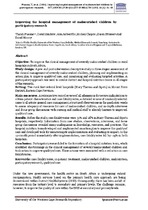Improving the hospital management of malnourished children by participatory research
Date
2004Author
Puoane, Thandi
Sanders, David
Ashworth, Ann
Chopra, Mickey
Strasser, Susan
McCoy, David
Metadata
Show full item recordAbstract
OBJECTIVE. To improve the clinical management of severely malnourished children in rural hospitals in South Africa.
STUDY DESIGN. A pre- and post-intervention descriptive study in three stages: assessment of the clinical management of severely
malnourished children, planning and implementing an action plan to improve quality of care, and monitoring and evaluating
targeted activities. A participatory approach was used to involve district and hospital nutrition teams in all stages of the
research.
SETTING. Two rural Wrst-referral level hospitals (Mary Theresa and Sipetu) in Mount Frere District, Eastern Cape Province.
MAIN MEASURES. A retrospective record review of all admissions for severe malnutrition to obtain patient characteristics and
case fatality rates, a detailed review of randomly selected cases to illustrate general case management, structured observations in
the paediatric wards to assess adequacy of resources for care of malnourished children, and in-depth interviews and focus
group discussions with nursing and medical staff to identify barriers to improved quality of care.
RESULTS. Before the study, case fatality rates were 50% and 28% in Mary Theresa and Sipetu hospitals, respectively. Information
from case studies, observations, interviews, and focus group discussions revealed many inadequacies in knowledge, resources,
and practices. The hospital nutrition team developed and implemented an action plan to improve the quality of care and developed
tools for monitoring its implementation and evaluating its impact. In the 12-month period immediately after implementation,
case fatality rates fell by ∼25% in both hospitals.
CONCLUSION. Participatory research led to the formation of a hospital nutrition team, which identiWed shortcomings in the
clinical management of severely malnourished children and took action to improve quality of care. These actions were associated
with a reduction in case fatality rates.

